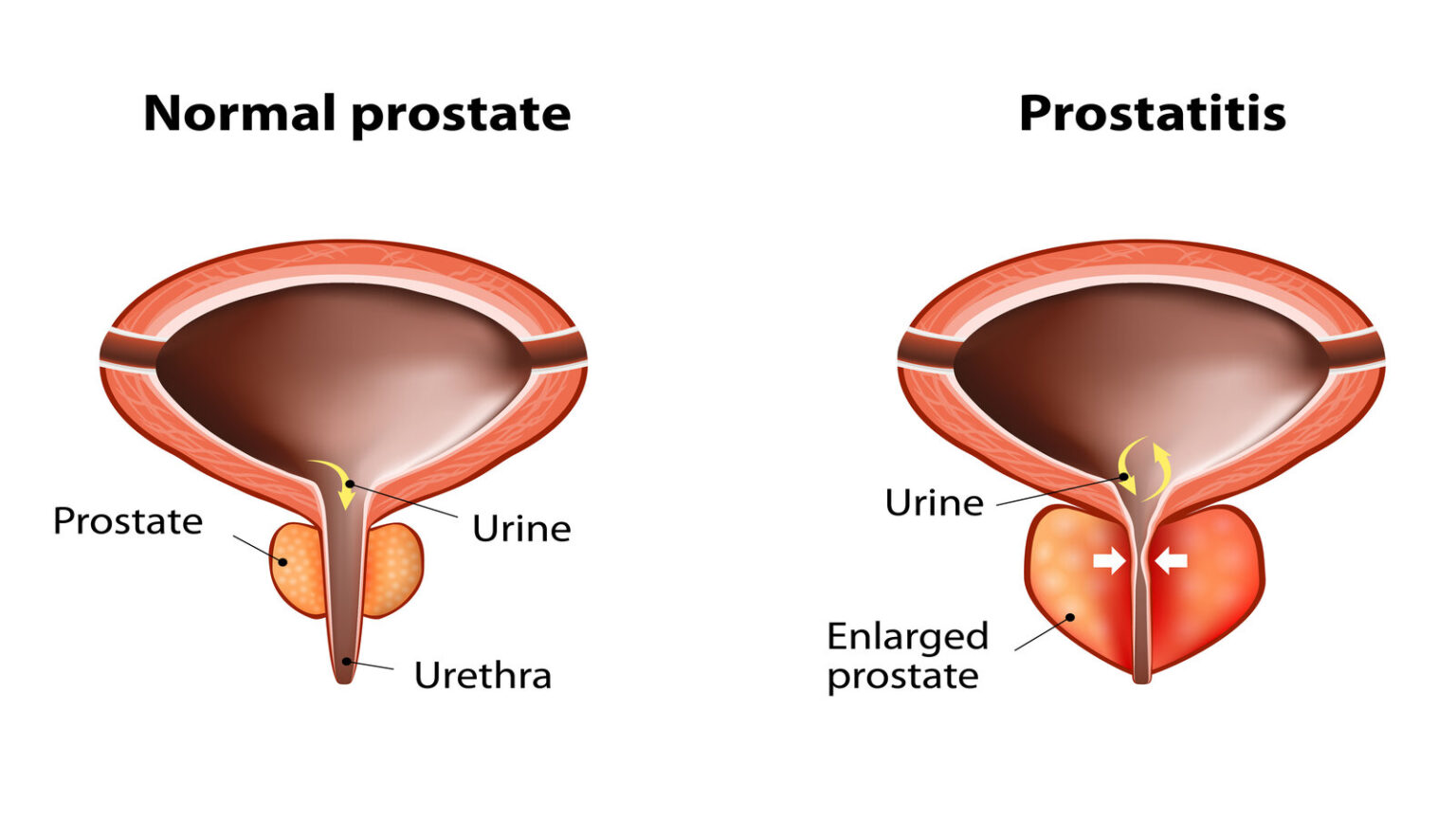Benign prostatic hyperplasia (BPH), also known as benign prostatic hypertrophy or benign prostatic obstruction, is a condition in men where the prostate gland enlarges.
The prostate is a small, walnut-shaped gland located below the bladder and in front of the rectum. It surrounds the urethra, the tube that carries urine from the bladder out of the body.
When the prostate enlarges, it can squeeze the urethra, making it difficult to urinate.

Types of BPH:
BPH is not categorized into different types,
but it can be classified based on the severity of symptoms:
Mild BPH: This is when you have few or no bothersome symptoms.
The prostate gland is a small, walnut-shaped gland in the male reproductive system that sits just below the bladder and surrounds the urethra, the tube that carries urine out of the body.
As men age, the prostate gland tends to grow larger, which can narrow the urethra and obstruct the flow of urine. This obstruction leads to various urinary symptoms characteristic of BPH.
Symptoms of mild BPH:
Frequent urination: You may need to urinate more often than usual, especially at night (nocturia).
Urgency: You may have a sudden and strong urge to urinate, making it difficult to hold urine.
Hesitation: You may have difficulty starting to urinate.
Weak stream: The flow of urine may be weak or stop and start.
Dribbling: You may leak a small amount of urine after urination.
Moderate BPH: This is when you have some bothersome symptoms, such as frequent urination, urgency to urinate, or difficulty starting urination.
It is the non-cancerous enlargement of the prostate gland in a more advanced stage than mild BPH, causing bothersome urinary symptoms.
Symptoms of moderate BPH are same for Mild BPH
Severe BPH: This is when you have significant bothersome symptoms, such as urinary retention (inability to empty the bladder completely), recurrent urinary tract infections, or blood in the urine.
What is Severe BPH?
BPH occurs when the prostate gland, which surrounds the urethra (the tube that carries urine from the bladder out of the body), enlarges to the point where it obstructs the flow of urine.
This enlargement is typically due to hormonal changes associated with aging, particularly an increase in dihydrotestosterone (DHT), a byproduct of testosterone metabolism.
As the prostate grows, it can compress the urethra, leading to urinary symptoms and complications.
Symptoms of Severe BPH:

Severe BPH can manifest with a range of urinary symptoms that significantly impact a person’s quality of life. These symptoms may include:
Urinary Frequency: Individuals with severe BPH often experience the need to urinate frequently, both during the day and at night (nocturia).
Urgency: There may be a sudden and compelling urge to urinate, sometimes leading to urinary incontinence (involuntary leakage of urine).
Weak Urinary Stream: The flow of urine may be weak or interrupted due to obstruction caused by the enlarged prostate.
Straining: Difficulty initiating urination or a sensation of incomplete emptying of the bladder, leading to straining during urination.
Dribbling: After urination, dribbling or leakage of urine may occur due to incomplete bladder emptying.
Urinary Retention: In severe cases, BPH can lead to urinary retention, where the bladder does not empty completely, increasing the risk of urinary tract infections and other complications.
Complications of Severe BPH:
If left untreated, severe BPH can lead to several complications, including:
Acute Urinary Retention (AUR): A sudden and complete inability to urinate, which requires immediate medical attention and often necessitates catheterization to relieve the obstruction.
Urinary Tract Infections (UTIs): Urinary retention and incomplete bladder emptying increase the risk of bacterial growth and UTIs, which can cause discomfort and may require antibiotic treatment.
Bladder Stones: Stagnant urine in the bladder can lead to the formation of bladder stones, which may cause pain, urinary frequency, and hematuria (blood in the urine).
Bladder Damage: Chronic urinary retention and overdistension of the bladder can lead to bladder muscle dysfunction and structural changes, affecting bladder function over time.
Kidney Damage: Severe and prolonged obstruction of urinary flow can ultimately lead to kidney damage, including hydronephrosis (swelling of the kidneys) and kidney failure if left untreated.

Prevention of BPH:
While the development of BPH may not be entirely preventable, adopting healthy lifestyle habits and proactive management strategies can help reduce the risk and alleviate symptoms:
Maintain a Healthy Diet: Consuming a balanced diet rich in fruits, vegetables, whole grains, and lean proteins can support overall prostate health. Limiting the intake of red meat, processed foods, and high-fat dairy products may also be beneficial.
Stay Active: Regular physical activity can help maintain a healthy weight and reduce the risk of BPH. Aim for at least 30 minutes of moderate exercise most days of the week, such as walking, swimming, or cycling.
Manage Stress: Chronic stress may contribute to hormonal imbalances and exacerbate symptoms of BPH. Practice stress-reducing techniques such as mindfulness, meditation, deep breathing exercises, or yoga to promote relaxation and well-being.
Limit Alcohol and Caffeine: Excessive consumption of alcohol and caffeine can irritate the bladder and worsen urinary symptoms associated with BPH. Drink alcohol and caffeinated beverages in moderation and avoid them close to bedtime.
How we are Helping BPH Patients:
Teamwork Homecare recognizes the challenges individuals with BPH face and offers specialized support to help manage their condition effectively. Here’s how Teamwork Homecare can assist:
Personalized HomeCare Plans: Teamwork Homecare develops individualized care plans tailored to the specific needs of each BPH patient. These plans encompass medication management, dietary guidance, and lifestyle recommendations to alleviate symptoms and improve overall prostate health.
Medication Management: Our team of Doctors, Nurses and Specialists assists BPH patients in managing their medications, ensuring adherence to prescribed treatment regimens, and monitoring for any side effects or interactions.
Continence Management: Teamwork Homecare provides support and guidance for BPH patients experiencing urinary incontinence, including strategies for bladder training, pelvic floor exercises, and the use of incontinence products if necessary.
Lifestyle Education: BPH patients receive education and guidance on lifestyle modifications to help alleviate symptoms and promote prostate health. This may include dietary recommendations, exercise programs, stress management techniques, and strategies for improving sleep quality.
Coordination of HomeCare: Teamwork Homecare coordinates with healthcare specialists, including urologists to ensure comprehensive management of BPH. This collaborative approach facilitates timely interventions, adjustments to treatment plans, and saving lives at your comfort.
Lets round it up!
While the exact cause of BPH remains unclear, adopting a healthy lifestyle and proactive management strategies can help reduce the risk and alleviate symptoms of the condition.
With personalized care plans, medication management, continence support, lifestyle education, and coordination of care, Teamwork Homecare plays a crucial role in supporting BPH patients and improving their quality of life.
Contact us today for help,
Airtel: 0200-909453
MTN: 039-256331
We are located at Naalya Estates, Golden Apartments
Or email us
Or visit our website
That’s been a Wrap, I hope you enjoyed this, if you did kindly give it a like 👍 and share with all those that may need it. 🙏
Lets catch up in the next one✌
Teamwork Homecare Team.



